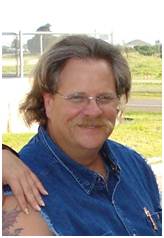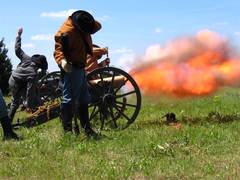
Name Danny Barfield
- Education Associates in Law Enforcement; Ongoing Training and Specialized Courses for this Field
- Target Audience Middle School

Danny Barfield knew ever since he was young that his calling was public service. He took his passion for helping people and hit the streets where he worked as a cop for years. His police career took a different turn when investigating a homicide case, and through this case Barfield learned that evidence collection and analysis was his next step in law enforcement. Read more to find out what Barfield loves about the science behind crime scene evidence!
I am the Evidence Room Manager for the Killeen Police Department in Texas. In addition to managing a team of Evidence Technicians, I ensure proper collection, analysis and storage of evidence for the department. One of the most common forms of analysis completed by the evidence lab is dusting for latent fingerprints, which can help identify suspects.
I think it chose me. I always knew I wanted to go into law enforcement and I served as a police officer for many years. Later I discovered a new interest while working a homicide case. While collecting and analyzing evidence from that crime scene I realized I was intrigued by the science behind all of it.
I wear several hats, but evidence is always my main priority. Every time evidence is collected from a crime scene I oversee the team that ensures it is stored properly at the Killeen Police Department. A lot of evidence has to be refrigerated or even frozen to be preserved, so we have to take every precaution necessary to ensure it is not contaminated. Before the evidence can be stored, my team has to process and analyze it. Some of the analysis techniques include fingerprint dusting and DNA extraction. Each day is different, but one thing remains constant - there is always evidence coming into our evidence room.
I definitely like the forensic science and new technology behind evidence analysis. There is nothing like finding something that has been overlooked by everyone else. Discovering the piece of the puzzle that cracks a case wide open is the ultimate high.
I never thought I liked STEM subjects as a kid - instead I was more of a history buff. Looking back on it though, I guess I've always had an interest in engineering. I didn't realize that all the tinkering I did as a kid was engineering. I still tinker - put things together, take them apart and re-purpose them. I'm also still really interested in history - civil war in particular.
though, I guess I've always had an interest in engineering. I didn't realize that all the tinkering I did as a kid was engineering. I still tinker - put things together, take them apart and re-purpose them. I'm also still really interested in history - civil war in particular.
There was not a moment I can pinpoint, but as long as I can remember I thought I would become a police officer. My mom worked for a police department, and I was a Law Enforcement Explorer with Killeen department. This was a great experience for me, and it reconfirmed what I kind of already knew - that I was suited for public service.
The education requirements are the biggest challenge. I have an Associate Degree in Law Enforcement and am close to retirement at this point, but these days the evidence technicians and forensic scientists that complete analysis on crime scene evidence have at least a Bachelor's degree, but most have a Master's or even Ph. D. I transitioned from being cop to the evidence room right when the field was changing and we were starting to use more science and technology to collect and process evidence. I do a lot of training classes and feel secure with my abilities, but technology and science are always changing. If you want to move into this field, you need to be prepared for a lifetime of learning.
I had several inspirations throughout my life. Being around officers as a kid really inspired me to go into law enforcement, but my transition over to evidence can be attributed to Texas Ranger, John Aycock. As a cop, I worked several crime scenes with him and he seemed impressed with my abilities. He mentored me and introduced me to a lot of important people in the evidence field, which ultimately provided me with the opportunity to move into the evidence room.
Check out local summer camps in your area that cater to crime scene investigation, such as SMU's CSI camps. Also, the Law Enforcement Explorer program is a great way to gain exposure to this field.
Lots of science and math classes are a great foundation, but you also need to be able to successfully communicate ideas and the research that you've done, so I think English is important. English is often overlooked, but sentence and paragraph structure is critical when you're writing a report that you want to look professional.
When I first started working with evidence, we did not have DNA analysis - science has changed so much since then, and it is difficult to predict where we will be in 10-15 years. We are relying a lot more on computer scientists when processing the evidence because technology is everywhere and used by everyone now - even criminals. Our tech guys analyze computers collected during crime scene searches and smart phone activity is being looked at more than ever before.
DNA - (deoxyribonucleic acid) and it provides genetic instructions for all living things.
Latent Fingerprints - term used in forensics to describe fingerprint marks left at a crime scene. A latent finger print may not be visible to the naked eye
Fingerprint Dusting - Method used to collect latent fingerprints that involves applying an ink colored dust to the area until it highlights fingerprints
DNA Extraction - the process of removing deoxyribonucleic acid (DNA) from the body cells
(as adapted from dictionary.com)
Do you think you might want to pursue a career in criminal justice one …